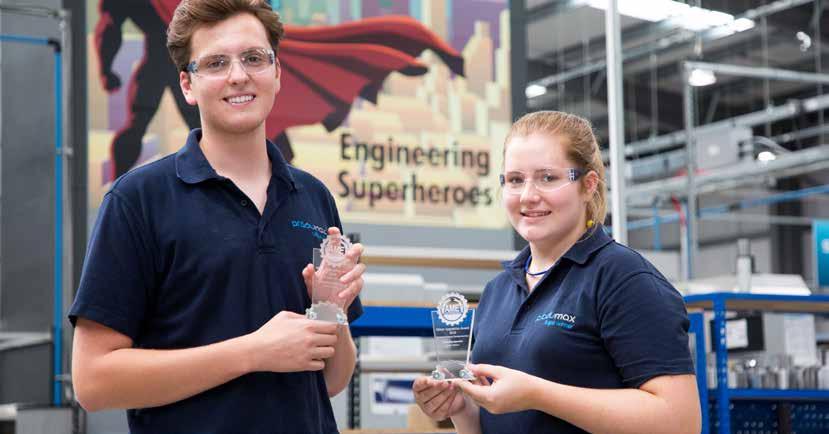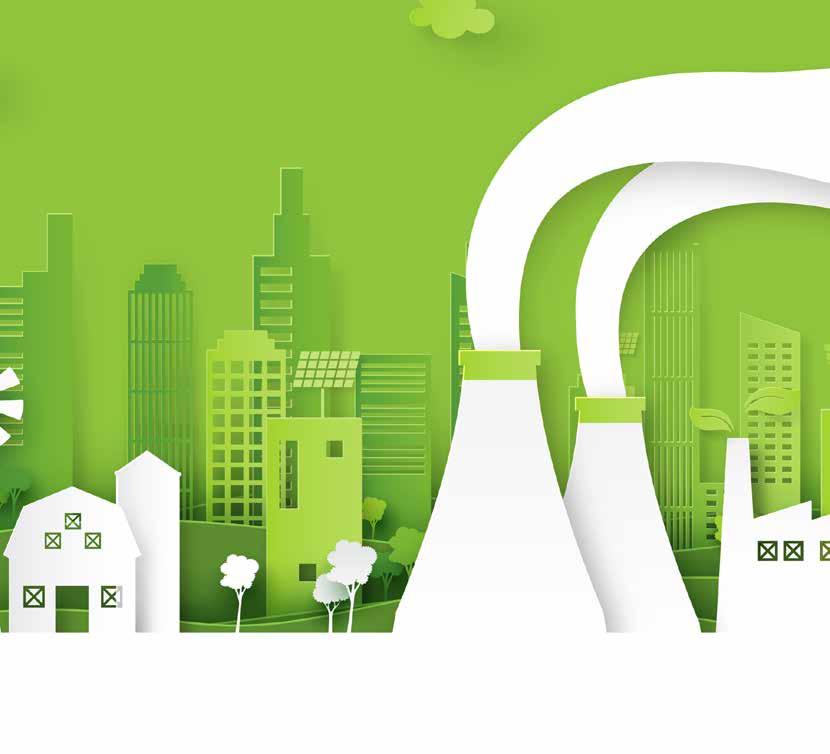
4 minute read
THE “NO-EXCUSE” FRAMEWORK FOR NET ZERO MANUFACTURING INDUSTRIES
A paper released by the World Economic Forum’s Industry Net Zero Accelerator initiative offers a framework to inspire industry action towards achieving net zero.
Co-authored by Cambridge Industrial Innovation Policy (CIIP) – Knowledge Partners of the initiative – the “No-Excuse” Framework for Net Zero Manufacturing Industries and Value Chains kick starts a series of planned activities to help businesses collaborate and accelerate change across industrial sectors.
Advertisement
Supported by compelling stories from the industrial world, the framework provides a structure for serious discussions around net zero and aims to empower executives to make their own organisational changes. The framework recognises that, while individual organisations can make important contributions towards net zero, no company can manage the transformation of its manufacturing facilities and value chains alone. Instead, systemic collaboration is fundamental at supply-chain and cross-sectoral levels, as well as between the public and private sectors.
To download the full paper, scan the QR code below:
Scail At Ai Uk 2023
The Supply Chain AI Lab (SCAIL) at the IfM participated at AI UK 2023 in London – the UK’s national showcase of data science and artificial intelligence – with a demo of an innovative supply system which aims to significantly lower emissions from delivery vehicles.
Dr Liming Xu explains: “The demo, ‘AgentChat: Agent-based Collaborative Logistics for Carbon Reduction’, presented as part of the environment sector of AI UK 2023 showcases a collaborative logistics platform using self-driving cars. Here, intelligent software agents that act on behalf of carriers, customers and suppliers discover and negotiate truck sharing opportunities using AI algorithms, share monetary value and converge on optimal delivery routes. A physical map and its digital dashboard were developed and connected as a digital twin to visualise this cyber-physical system.”
In the real world, this system can be applied to help delivery vehicles operate more sustainably and efficiently. British roads are teeming with vehicles that transport goods between providers and consumers, and heavy goods vehicles (HGVs) are currently responsible for 19% of domestic transport emissions in the UK. Because of a lack of high-level coordination, many HGV journeys take place without much cargo, with average truck utilisation remaining around 60%.
Ifm Postdoctoral Awards 2022
Congratulations to our 2022 IfM Postdoctoral Award winners for their excellent contributions to research, teaching and academic citizenship.
The 2022 award winners are:
Excellence in Research: Dr Manuel Herrera
Excellence in Teaching: Dr Zhengyang Ling
Excellence in Academic Citizenship: Dr Siamak Kheybari, Dr Niamh Fox
Specially Commended: Dr Pratheeba Vimalnath
The IfM Postdoctoral Awards were established in 2019 in recognition of the vital role that postdocs play in driving research and innovation, delivering teaching and contributing to the academic community.
It is both efficient and sustainable to optimise the use of available space in delivery vehicles, but it is not widely done due to lack of orchestration, and the transaction cost involved in available solutions, which create a lock-in effect on carriers. Comprehensive interventions have the potential to be very impactful, given the size of the delivery industry which connects the dots of many of our supply chains. A system like the one the SCAIL team is working on can contribute to greater collaboration between delivery services – a bit like carpooling.
Head of SCAIL, Professor Alexandra Brintrup said “We urgently need a radical re-think of logistics systems in order to be able to achieve net-zero. Current delivery planning systems cannot optimise routes at the system level due to a lack of information sharing. Automation can help alleviate the manual effort involved in truck sharing, while at the same time allowing all parties to gain value from it. But logistics providers will need to get used to a new way of thinking.”
The demo will continue to be housed at the IfM, and the research group plans to develop its capabilities further with more advanced features.
Manufacturing Fun At The Cambridge Festival
On Saturday 18th March 2023, we hosted another successful Cambridge Festival at the IfM. This year’s event was the most well-attended since COVID-19 and attracted over 500 visitors of all ages to come learn about and play with engineering and manufacturing.
Head of the IfM, Tim Minshall, kicked off the afternoon with an engaging talk about how all the stuff around us is made, harking back to those early days of the pandemic when the vulnerability of international supply chains suddenly became obvious (remember the sudden shortage of toilet rolls?).
He went on to give the audience a peek into the amazing journeys that our things go on before they reach the shop shelves or our front doors, as well as possible ways to make those journeys shorter and more sustainable.
Several IfM research groups were represented and offered a host of activities for curious minds. The NanoManufacturing group made fragrant batteries with lemons and gherkins, and next door, Fluids in Advanced Manufacturing made lava lamps and dancing disco balls from store cupboard ingredients.
With demonstrations and activities throughout the building, there was a wonderful buzz at the IfM all afternoon. Many of the younger visitors took the opportunity to share their thoughts on their way out by drawing and writing about their day. Fortunately, they seemed to enjoy it as much as we did!
The Uk Innovation Report 2023
The findings from the 2023 edition of the UK Innovation Report, compiled by Cambridge Industrial Innovation Policy, are now available.
Among other analyses, the report looks at whether the UK is producing enough scientists and engineers, and how innovation translates into internationally competitive industries and well-paid jobs. It also provides deep dives into the food and drinks, and aerospace sectors, offering insights into the structure and performance of these UK industries.
You can read more about the report’s findings on page 34 or you can scan the QR code to download the full report.
New Study For The Government Office For Science Explores Opportunities For Uk Modern Industrial Biotech Beyond Human Health
A new study commissioned by the Government Office for Science (GOS) has been published by Cambridge Industrial Innovation Policy. The report, ‘Life sciences beyond human health: modern industrial biotechnology in the UK’ seeks to map and characterise the UK non-human health life science sector.
Building on the evidence base on the benefits of strengthening the UK non-human health life sciences sector in terms of economic, social and environmental gains, co-author David Leal-Ayala says: “We hope the report is a first step towards better understanding and informing strategic thinking on the opportunities for the modern industrial biotechnology sector in the UK over the coming years.”
Former Government Chief Scientific Adviser, Sir Patrick Vallance, said: “I welcome this report for shining a light on UK biotech beyond healthcare. It provides an important evidence base for government as it seeks to understand growth opportunities in this exciting and wide-ranging sector.”
Scan the QR code to download the report.









